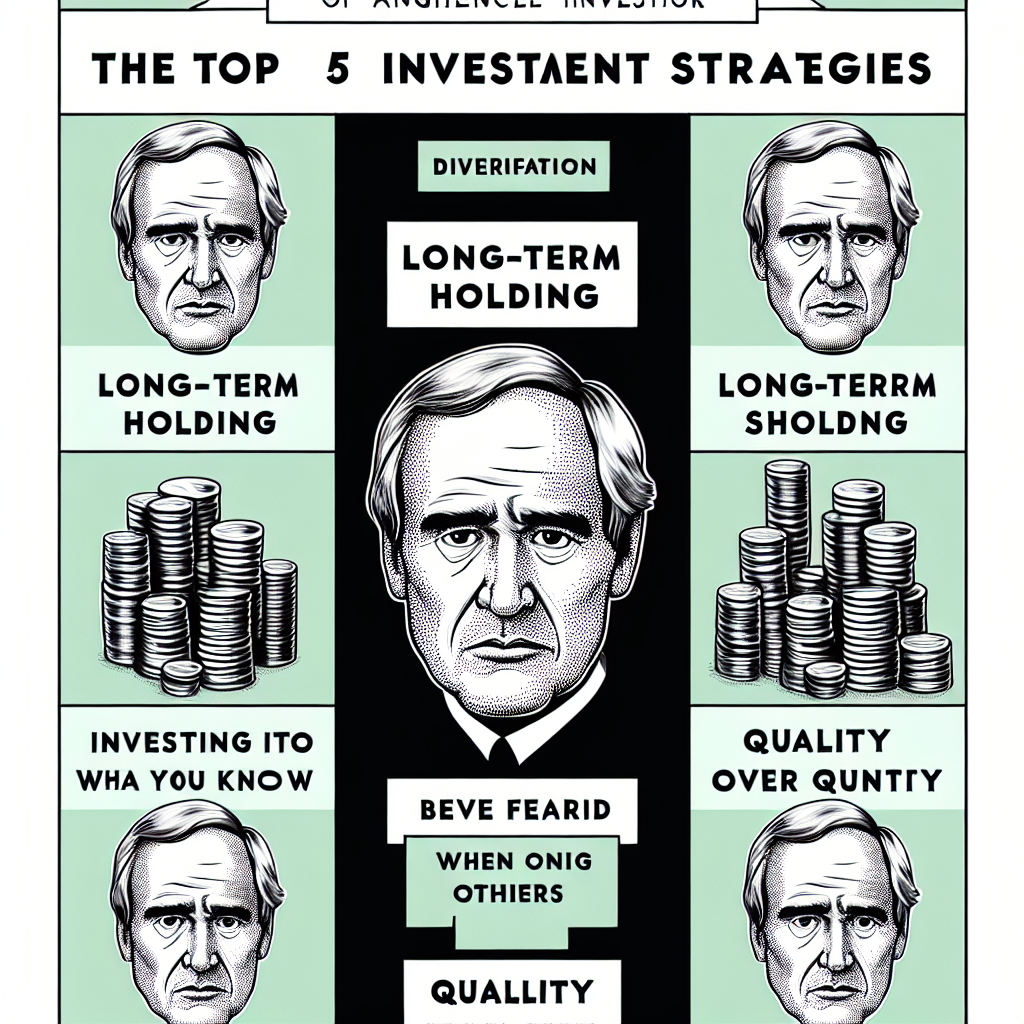Warren Buffett’s Advice on Wealth Management for Young Investors
The Power of Compound Interest: How to Start Investing Early and Let Your Money Work for You
Warren Buffett, one of the most successful investors in the world, has often shared his wisdom and advice on wealth management. As a young investor, it can be overwhelming to navigate the world of finance and figure out the best way to manage your money. However, one piece of advice from Buffett stands out as a crucial factor in building wealth: the power of compound interest.
Compound interest is the concept of earning interest on both the initial investment and the accumulated interest. In simpler terms, it means that your money can grow exponentially over time. This is why starting to invest early is crucial, as it allows for more time for compound interest to work its magic.
To understand the power of compound interest, let’s look at an example. Say you invest $10,000 at the age of 25 with an annual interest rate of 8%. By the time you turn 65, that initial investment would have grown to over $100,000. However, if you wait until you are 35 to invest the same amount, your final amount would only be around $46,000. That’s a significant difference, and it all comes down to the power of compound interest.
Buffett himself has emphasized the importance of starting early when it comes to investing. In an interview with CNBC, he said, ”The earlier you start, the better off you’re going to be.” He also added, ”The best investment you can make is in yourself. The more you learn, the more you’ll earn.”
So, how can young investors take advantage of compound interest and start building their wealth? The first step is to educate yourself about investing. As Buffett mentioned, the more you learn, the more you’ll earn. Take the time to research and understand different investment options, such as stocks, bonds, and mutual funds. This will help you make informed decisions about where to put your money.
The next step is to start investing as early as possible. Even if you can only afford to invest a small amount, it’s better than not investing at all. As your income grows, you can increase your investments. The key is to be consistent and make it a habit to save and invest regularly.
Another crucial aspect of wealth management is diversification. Buffett has often stressed the importance of not putting all your eggs in one basket. This means spreading your investments across different industries and asset classes. By diversifying, you reduce the risk of losing all your money if one investment performs poorly.
It’s also essential to have a long-term mindset when it comes to investing. The stock market can be volatile, and there will be ups and downs. However, history has shown that the market tends to go up over time. By staying invested for the long haul, you can ride out any short-term fluctuations and benefit from the power of compound interest.
One common mistake that young investors make is trying to time the market. They may wait for the ”perfect” time to invest, thinking they can buy low and sell high. However, this is a risky strategy, and even the most experienced investors struggle to time the market accurately. Instead, focus on investing consistently and staying invested for the long term.
In conclusion, Warren Buffett’s advice on wealth management for young investors is simple yet powerful: start early, educate yourself, diversify, and have a long-term mindset. By following these principles and taking advantage of the power of compound interest, you can set yourself up for financial success in the future. Remember, the key is to be consistent and patient, and let your money work for you. As Buffett famously said, ”Someone’s sitting in the shade today because someone planted a tree a long time ago.” So start planting your financial tree today and watch it grow over time.
Invest in What You Know: Warren Buffett’s Strategy for Building a Strong Investment Portfolio
When it comes to building wealth, there is no one better to turn to for advice than Warren Buffett. Known as the ”Oracle of Omaha,” Buffett is one of the most successful investors in the world, with a net worth of over $100 billion. His investment strategies have stood the test of time and have made him a household name in the world of finance. But what can young investors learn from Buffett’s approach to wealth management? In this article, we will explore one of his key strategies for building a strong investment portfolio: investing in what you know.
Buffett’s philosophy is simple: invest in companies that you understand and believe in. This may seem like common sense, but it is a strategy that many investors overlook. Instead, they chase after the latest trends or try to predict the next big thing. But Buffett believes that this approach is risky and can lead to poor investment decisions.
So, what does it mean to invest in what you know? It means focusing on companies and industries that you have a good understanding of. For example, if you work in the tech industry, you may have a better understanding of the trends and potential growth of tech companies. Or if you are a frequent shopper at a certain retail store, you may have insights into their customer base and potential for growth. By investing in companies that you have a personal connection with, you are more likely to make informed and successful investment decisions.
But investing in what you know goes beyond just personal experience. It also means doing your research and understanding the fundamentals of a company before investing. Buffett famously said, ”Never invest in a business you cannot understand.” This means taking the time to read financial reports, understand the company’s business model, and analyze its competitive advantage. By doing this, you can make more informed decisions and avoid investing in companies that you do not fully understand.
Another aspect of Buffett’s strategy is to focus on long-term investments. He is known for his buy-and-hold approach, where he invests in companies for the long haul. This means not getting caught up in short-term market fluctuations and instead focusing on the long-term potential of a company. By investing in what you know and believe in, you are more likely to have the patience and conviction to hold onto your investments for the long term.
But what about diversification? Isn’t it risky to invest in just a few companies? Buffett’s approach to diversification is different from what many may think. He believes in focusing on a few high-quality companies rather than spreading your investments too thin. This allows for a more concentrated and focused portfolio, which can lead to higher returns. However, this strategy does require careful research and analysis to ensure that the companies you invest in are truly high-quality and have a strong potential for growth.
In addition to investing in what you know, Buffett also emphasizes the importance of staying disciplined and avoiding emotional decision-making. It can be tempting to follow the crowd or make impulsive investment decisions, but Buffett advises against it. He believes in sticking to a well-thought-out investment plan and not letting emotions cloud your judgment.
In conclusion, Warren Buffett’s advice on wealth management for young investors is to invest in what you know. By focusing on companies and industries that you have a personal connection with and understanding the fundamentals of a company before investing, you can make more informed and successful investment decisions. This, combined with a long-term approach and disciplined decision-making, can help young investors build a strong and successful investment portfolio. As Buffett himself said, ”The stock market is a device for transferring money from the impatient to the patient.” So, take the time to invest in what you know and be patient for the long-term rewards.
Patience and Long-Term Thinking: Lessons from Warren Buffett on Weathering Market Volatility
Warren Buffett, also known as the Oracle of Omaha, is one of the most successful investors in the world. With a net worth of over $100 billion, he has become a household name and a role model for many young investors. But what sets him apart from others in the investment world? One of the key factors to his success is his approach to wealth management, which is based on patience and long-term thinking.
In today’s fast-paced world, where instant gratification is the norm, it can be challenging for young investors to adopt a patient and long-term mindset. However, as Warren Buffett has proven time and time again, this approach is crucial for weathering market volatility and achieving long-term success in the world of investing.
One of the first lessons that young investors can learn from Warren Buffett is the importance of patience. Buffett once famously said, ”The stock market is a device for transferring money from the impatient to the patient.” This statement holds a lot of truth, as many investors fall into the trap of trying to time the market and make quick profits. However, Buffett’s success has been built on the foundation of patience and holding onto investments for the long haul.
This approach is evident in Buffett’s investment strategy, which focuses on buying and holding quality companies for the long term. He believes in investing in companies with strong fundamentals and a competitive advantage, rather than chasing short-term gains. This strategy has proven to be successful, as many of Buffett’s investments have been held for decades, resulting in significant returns.
Another crucial aspect of Warren Buffett’s wealth management advice is the importance of long-term thinking. In a world where information is readily available, and the stock market can be highly volatile, it can be tempting to make impulsive decisions based on short-term fluctuations. However, Buffett advises against this and encourages investors to think long-term.
Buffett’s long-term thinking is evident in his investment philosophy, which focuses on the intrinsic value of a company rather than its current market price. He believes that the stock market is a voting machine in the short term but a weighing machine in the long term. This means that in the short term, the market may be influenced by emotions and speculation, but in the long run, the true value of a company will prevail.
This approach requires a great deal of discipline and the ability to tune out the noise of the market. It also means being comfortable with short-term fluctuations and not being swayed by them. As Buffett famously said, ”Be fearful when others are greedy, and be greedy when others are fearful.” This advice highlights the importance of having a long-term perspective and not being influenced by short-term market trends.
In addition to patience and long-term thinking, Warren Buffett also emphasizes the importance of diversification in wealth management. He believes in not putting all your eggs in one basket and spreading out investments across different industries and asset classes. This strategy helps to mitigate risk and protect against market volatility.
In conclusion, Warren Buffett’s advice on wealth management for young investors is centered around patience and long-term thinking. His success has been built on these principles, and they have proven to be effective in navigating the ups and downs of the stock market. As young investors, it is essential to adopt a patient and long-term mindset and not be swayed by short-term fluctuations. By following Buffett’s advice, we can weather market volatility and achieve long-term success in our investment journey.
Avoiding High Fees and Expenses: Warren Buffett’s Advice on Keeping Your Investment Costs Low
Warren Buffett, also known as the Oracle of Omaha, is one of the most successful investors in the world. With a net worth of over $100 billion, he has become a household name in the world of finance. But what sets him apart from other investors is not just his wealth, but also his wisdom and advice on wealth management. In particular, Buffett has some valuable insights for young investors on how to keep their investment costs low.
One of the key pieces of advice that Buffett gives to young investors is to avoid high fees and expenses. This may seem like a no-brainer, but it is surprising how many people overlook this important aspect of wealth management. Buffett himself has famously said, ”The most important quality for an investor is temperament, not intellect. You need a temperament that neither derives great pleasure from being with the crowd or against the crowd.” In other words, don’t follow the crowd when it comes to investing, and don’t let high fees and expenses eat away at your returns.
So, how can young investors avoid high fees and expenses? The first step is to educate yourself about the different types of fees and expenses associated with investing. These can include management fees, trading fees, and expense ratios. Management fees are charged by the professionals who manage your investments, while trading fees are charged every time you buy or sell a stock or fund. Expense ratios, on the other hand, are the annual fees charged by mutual funds or exchange-traded funds (ETFs) to cover their operating costs.
One of the best ways to keep your investment costs low is to invest in low-cost index funds. These are funds that track a specific market index, such as the S&P 500, and have lower fees compared to actively managed funds. Buffett himself has recommended index funds for the average investor, stating that ”consistently buy an S&P 500 low-cost index fund…I think it’s the thing that makes the most sense practically all of the time.”
Another way to avoid high fees and expenses is to be mindful of the impact of taxes on your investments. Buffett has famously said, ”Rule No. 1: Never lose money. Rule No. 2: Never forget Rule No. 1.” This applies to taxes as well. By being aware of the tax implications of your investments, you can avoid unnecessary losses and keep more of your returns. For example, investing in tax-efficient funds or holding investments for the long-term can help minimize the impact of taxes on your portfolio.
In addition to being aware of fees and taxes, Buffett also advises young investors to be patient and avoid frequent trading. This is because every time you buy or sell a stock or fund, you incur trading fees and potentially trigger capital gains taxes. Moreover, frequent trading can also lead to emotional decision-making, which can be detrimental to your long-term investment strategy. As Buffett has famously said, ”The stock market is a device for transferring money from the impatient to the patient.”
Lastly, Buffett emphasizes the importance of diversification in keeping investment costs low. By spreading your investments across different asset classes, industries, and geographies, you can reduce the risk of losing money and potentially increase your returns. This is because diversification helps to mitigate the impact of market fluctuations on your portfolio. As Buffett has said, ”Diversification is protection against ignorance. It makes little sense if you know what you are doing.”
In conclusion, Warren Buffett’s advice on wealth management for young investors is to avoid high fees and expenses. By educating yourself about the different types of fees and expenses, investing in low-cost index funds, being mindful of taxes, avoiding frequent trading, and diversifying your portfolio, you can keep your investment costs low and increase your chances of long-term success. As Buffett himself has said, ”The best investment you can make is in your own abilities. Anything you can do to develop your own abilities or business is likely to be more productive.” So, take Buffett’s advice and start building your wealth wisely.
The Importance of Education and Research: Warren Buffett’s Emphasis on Continuous Learning for Successful Wealth Management
Warren Buffett, one of the most successful investors in the world, is known not only for his wealth but also for his wise advice on wealth management. As a young investor, it can be overwhelming to navigate the world of finance and make smart decisions about your money. However, Buffett’s advice on education and research can serve as a valuable guide for young investors looking to build their wealth.
One of the key principles that Buffett emphasizes is the importance of education. He believes that continuous learning is crucial for successful wealth management. This means that as a young investor, you should never stop learning about the world of finance and investing. This may seem like a daunting task, but it doesn’t have to be. Buffett suggests starting with the basics and gradually building your knowledge and understanding from there.
One way to educate yourself is by reading. Buffett is an avid reader and has often credited his success to the books he has read. He recommends reading books on investing, economics, and business to gain a better understanding of the financial world. Reading can also help you develop critical thinking skills and learn from the experiences of successful investors.
In addition to reading, Buffett also stresses the importance of research. He believes that thorough research is essential before making any investment decisions. This means understanding the company you are investing in, its financials, and its industry. Buffett famously said, ”Never invest in a business you cannot understand.” This highlights the importance of doing your due diligence and not blindly following trends or tips from others.
Moreover, Buffett advises young investors to focus on long-term investments rather than short-term gains. This requires patience and discipline, but it can lead to more significant returns in the long run. To make informed decisions about long-term investments, you need to have a deep understanding of the company and its potential for growth. This is where education and research come into play.
Another aspect of education and research that Buffett emphasizes is the importance of understanding the market. He believes that investors should have a basic understanding of economics and how the market works. This can help you make more informed decisions and avoid making impulsive choices based on emotions or market fluctuations.
Furthermore, Buffett encourages young investors to seek out mentors and learn from their experiences. This could be someone you know personally or someone you admire from afar. Mentors can provide valuable insights and guidance, and their experiences can serve as valuable lessons for your own wealth management journey.
In addition to education and research, Buffett also stresses the importance of staying humble and continuously learning from your mistakes. As a young investor, you are bound to make mistakes, but it’s crucial to learn from them and not let them discourage you. Buffett himself has made mistakes in his career, but he has always learned from them and used them to improve his investment strategies.
In conclusion, Warren Buffett’s emphasis on education and research for successful wealth management is a valuable lesson for young investors. By continuously learning, doing thorough research, and seeking guidance from mentors, you can make informed decisions and build a strong foundation for your financial future. Remember, wealth management is a journey, and it requires patience, discipline, and a willingness to learn and adapt. With Buffett’s advice in mind, you can set yourself up for long-term success in the world of investing.




















